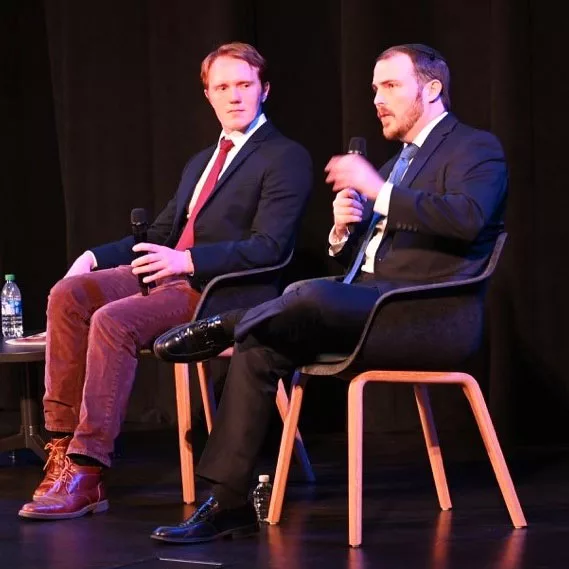The concept of understanding

Derek Black, a former white nationalist, and Matthew Stevenson, an Orthodox Jew, addressed members of the Dallas-Fort Worth community on Nov. 12, discussing their unlikely friendship and Black’s transformation.
Texas Christian University Hillel brought a delegation of students to hear the men speak at the Dallas Holocaust and Human Rights Museum.
Black explained to the crowd that he was raised by a family with deep ties to the white nationalist movement. His godfather was former Ku Klux Klan leader David Duke, who once referred to Black as “the leading light of our movement.”
His father founded Stormfront, a white nationalist website. As a child, Black created the Stormfront for Kids page and publicly championed his family’s political views.
When Black enrolled at New College of Florida, he tried to keep his beliefs secret, knowing he would encounter and hope to befriend people who belonged to the very groups he had been raised to believe were inferior.
“I had this ideology that, on an individual level, I couldn’t predict anything about people, but that didn’t mean that white nationalism about large groups didn’t have the right world view,” he said. “I just tried to keep that dichotomy. I tried to tell myself that it wasn’t contradictory…it was much more contradictory than I anticipated.”
While he tried to keep his past hidden during college, Black said he had known even then that his politics would eventually become public. That fateful day arrived during his second semester while he was studying abroad in Germany. A student posted about his background on a school-wide message board, known as the forum.
“All of the relationships I’d built just melted away because people felt betrayed that I didn’t tell them about this part of myself, [and because] their identities were threatened by [my] worldview,” Black said.
While most students shunned Black, Stevenson, the only Orthodox Jew at New College, invited him to attend his weekly Shabbat dinners.
“One of the most central concepts that was drilled into me growing up was the concept of human dignity,” he said. “That I have the ability and the right to disagree with people, to protest against what they’re doing, but I don’t have the right to treat somebody without human dignity.”
Before the first dinner, Stevenson was careful to warn the other attendees about Black’s past. While most were critical of the decision and chose not to attend, some people still decided to go to the dinner.
Stevenson hoped that by inviting Black, the latter would start to question his views.
“I was absolutely of the hope that by forming these connections, it would become increasingly difficult to advocate for real or perceived violence against Jews, people of color etc.,” he said.
Over time, Black’s conversations with the people attending those dinners caused him to question his beliefs.
“One by one, these bits of evidence over the years, each one didn’t break my worldview. But after two years…there is no evidence left,” he said.
But in addition to the “evidence,” Black also said the relationships he formed with people of different backgrounds catalyzed his change.
He asked, “How can you be friends with somebody and say that’s an individual decision, and also say that [it doesn’t matter what happens] to their family, their friends, their neighborhood, their community?”
Sarah Davis, a senior and active student at TCU Hillel, said the men’s friendship taught her how people can have important discussions about tough issues.
“It might not look like inviting a white supremacist over to Shabbat,” she said. “It could be as simple as starting a conversation. Or being gracious and friendly without an agenda.”
Julia Murray, a junior who went to the event with TCU Hillel, said she connected with the two men’s calls for communication and empathy.
“Ultimately, our goal should be understanding,” she said. “For if we understand one another, we are one step closer to finding truth, whether it be within or outside of ourselves.”